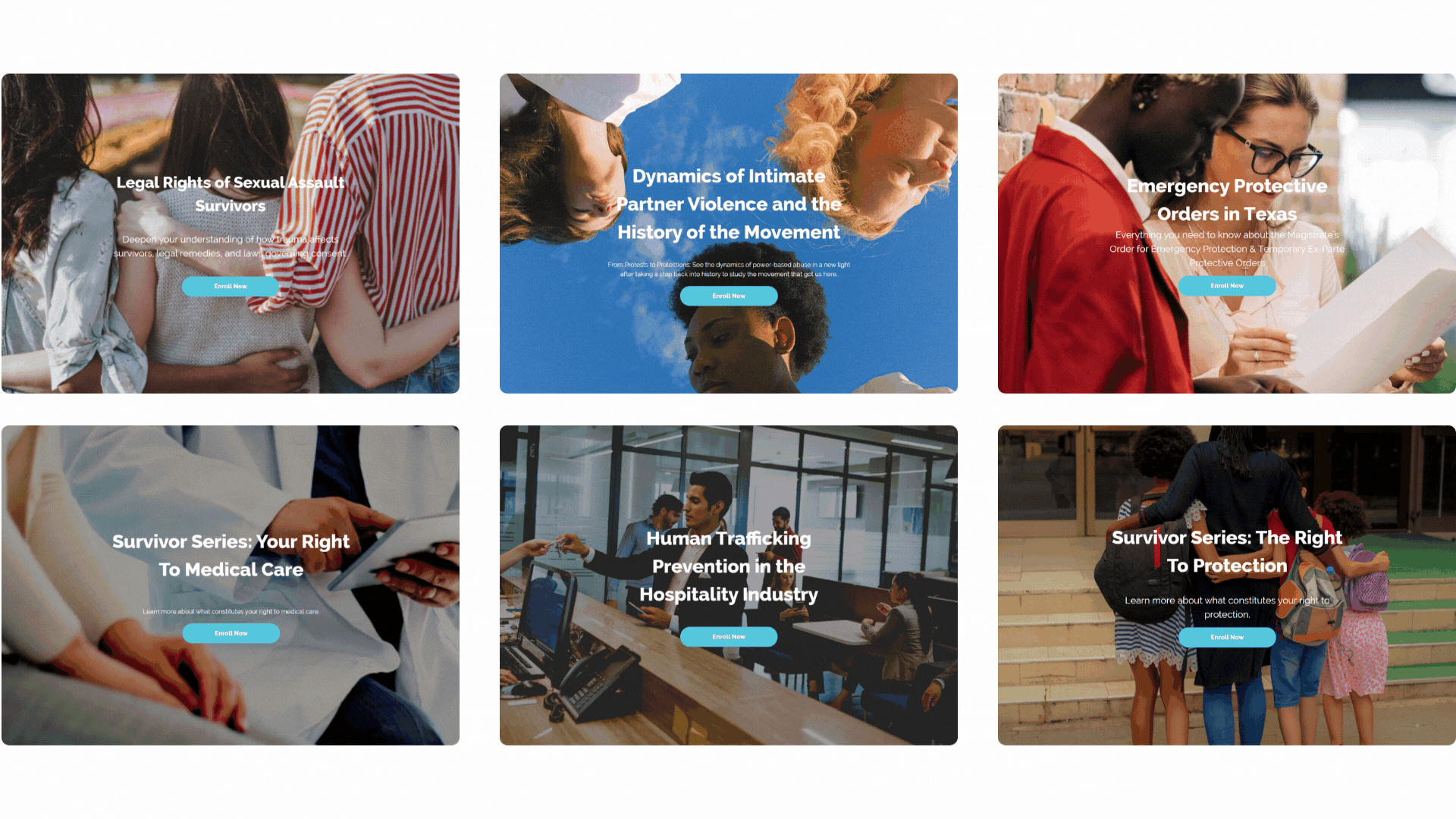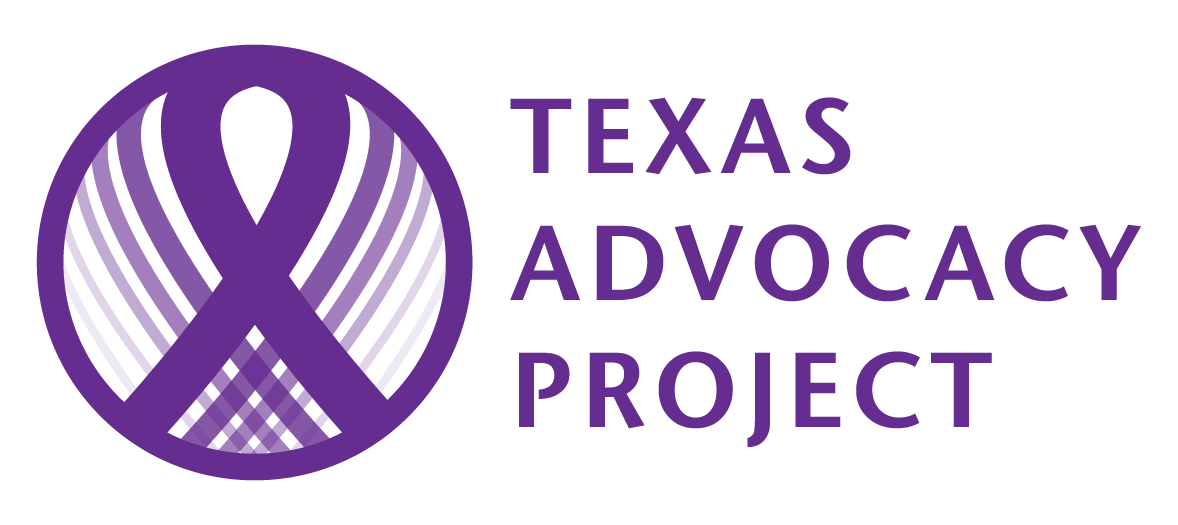GET HELP NOW: Call 800-374-HOPE | Apply for Services Online/Solicitar Servicios en Línea
Email Us | Donate | Email List Sign Up | En Español
Upcoming Events | Teen Ambassadors of Hope | Black & White Ball | Handbags for Hope
Texas Advocacy Project offers FREE in-person and virtual trainings to advocates, survivors, judges and prosecutors, law enforcement, educators, teens, military members, health care professionals, and more!
Individuals or groups under 15 may visit our training portal, Teachable, to complete a course or view our public training calendar for any available live webinars. Groups of 15 or more may request an in-person or virtual training session by submitting the Training Request Form below.
Teachable | TAP's Training Portal
Do you want to take a course on your own time or have a group fewer than 15? Access Texas Advocacy Project's Online Courses Anytime, Anywhere!

Request a Training Session
Available Trainings
Browse through the following topics, Prevention, Survivor-Centered Advocacy, Law, and Specialized, to select the appropriate training for you and your organization! Once you've determined the training(s) you would like to request, scroll down to fill out and submit our Training Request Form.
Prevention
- In Their Shoes: Teen Dating Violence Simulation (Virtual or In-Person Interactive Activity!) (1.5 hrs)
[Audience: Teens & Anyone Who Works With Teens] This is a scenario-based training designed to help participants talk about what dating is like for today’s teens—from their perspective. Participants will become teen characters, make choices about their relationships, and see what happens. “In Their Shoes” provides a snapshot of unhealthy teen relationships and generates a thoughtful discussion about what happens in unhealthy relationships and what opportunities exist to support those experiencing them. This simulation is great for groups of all sizes, teens and those who work with teens, but works best with 20-40 people and takes about an hour and a half to 2 hours to experience and debrief.
- Happy & Healthy: Preventing Teen Dating Violence & Cultivating Secure Relationships (1.0 hr)
[Audience: Teens] In this presentation, learn the differences between conflict resolution in a healthy relationship and controlling behaviors that are often precursors to dating violence and digital abuse. Young people will discover communication approaches and techniques to respond to requests that do not respect their boundaries. Options for staying safe in school are also discussed.
Survivor-Centered Advocacy
- Advanced Safety Planning (1.0 hr)
Participants will learn how to help survivors of intimate partner violence and sexual assault create an individualized plan to help reduce the risks they and their children face. This presentation will move beyond the basic safety plan and identify unique circumstances that require additional safety precautions and the best practices to employ.
- Empowerment-Based and Trauma-Informed Response to Survivors of Violence (1.0 hr)
This training will first identify what empowerment-based models are and will explain how these models can be replicated and implemented into each practice. Empowerment-based advocacy can help survivors identify their own strengths and reframe their sense of self, therefore enhancing their capacity for self-determination. Survivors of power-based violence, including intimate partner violence and sexual assault, experience ongoing trauma that affects the way they will respond to and heal from victimization. This workshop will help participants identify how trauma affects survivors of violence, the neurobiology of trauma within the brain, and appropriate ways to serve individual survivors.
- In Her Shoes: Living with Domestic Violence (Virtual or In-Person Interactive Activity!) (1.5 hrs)
This is a scenario-based activity designed to help participants talk and learn about domestic violence. Participants will become characters, make choices about their relationships, and see what happens. In Her Shoes provides a snapshot of violent and coercive relationships based on real-life stories. The experience generates a thoughtful discussion about what happens in unhealthy relationships and what opportunities exist to support those experiencing them. This simulation is great for groups of all sizes but works best with 20-40 people and takes about an hour and a half to 2 hours to experience and debrief.
- In Her Shoes: Economic Justice Edition (Virtual or In-Person Interactive Activity!) (1.5 hrs)
This is a scenario-based activity designed to help participants understand the experiences of survivors of domestic violence. The scenarios are based on true stories – and typify the complex and dynamic nature of domestic violence, while also calling out the more specific barriers that survivors face when they are living in poverty or are plunged into poverty as a result of domestic violence. This simulation is great for groups of all sizes but works best with 20-40 people and takes about an hour and a half to 2 hours to experience and debrief.
Law
- Texas Advocacy Project’s Services (0.75 hr)
In this workshop we will discuss the myriad of services that Texas Advocacy Project offers as well as process through ways we can provide support to your program. Our goal is to strengthen our relationship with organizations across the state and bridge gaps that our survivors are currently facing. The time spent together will help our team gain a deeper understanding and insight about your program and community’s needs.
- Understanding Protective Orders in Texas (1.5 hrs)
This training explains the different types of protective orders, how they work, and how they can be utilized to improve survivor safety and to prevent future violence. This workshop also discusses the changes and additions made to protective orders as mandated in the last legislative session. This presentation will cover Family Violence, Dating Violence, Sexual Assault, Stalking, Trafficking Protective Orders, and Emergency Protective Orders.
- Intimate Partner Violence, Stalking, and Digital Abuse (1.5 hrs)
In an age when it is easier than ever for abusers to use technology and communication tools to control, stalk, and harass victims, it is important for community members to understand what stalking behaviors look like and how the law defines these crimes. In this training we will identify the legal and social remedies available to protect survivors and discuss practices for safety planning around technology.
- Legal Advocacy and Unauthorized Practice of Law (1.0 hr)
This training will help legal advocates understand their role and the boundaries within their position. Advocates will gain knowledge on how to navigate clients through the civil and criminal justice systems while providing advocacy and support.
Specialized
Tailored training sessions on specialized subjects available by request and through consultation.
- We're All In This Together: A Comprehensive Approach to Preventing Teen Dating Violence (1.5 hrs)
[Audience: Anyone Who Works With Teens] Prevention encompasses everything from education and legislation to legal protections when it comes to teen dating violence and sexual assault. This presentation covers the greater impact of adverse and positive childhood experiences on the community and the latest research in positive youth development. Dynamics of power-based abuse and ways to support teens in establishing and maintaining healthy romantic relationships and friendships will also be discussed. Participants will walk away with practical strategies and tools to not only prevent teen dating violence specifically, but all forms of interpersonal violence in their community.
- Beyond the Bathroom Poster: Recognizing & Preventing Teen Trafficking (1.5 hrs)
[Audience: Anyone Who Works With Teens] Young victims of human trafficking have many unique needs when compared to young victims of other forms of power-based abuse. This training will cover the dynamics of sex and labor trafficking in teen populations, including types of traffickers, methods traffickers use to recruit victims, grooming tactics, and the role social media plays in this form of exploitation. Participants will also gain knowledge in risk factors and the broader impact of adverse childhood experiences on communities. Attendees will walk away with survivor insights, legal remedies, and effective strategies in recognizing and preventing trafficking in their programs.
- Beyond the Criminal Case: Holistic Solutions for Human Trafficking Survivors through Attorney and Social Worker Partnerships (1.0 hr)
Victims of human trafficking have many unique needs when compared to victims of other forms of power-based abuse. In this workshop, presenters will take a deep dive into the dynamics of this civil rights issue, and will introduce available civil legal remedies that provide relief and freedom for human trafficking victims. This training will also cover innovative ways to bring together attorneys and social workers to even more successfully support survivors through trauma-informed services and care plans.
- Working Together While Apart: Navigating Co-Parenting with an Abusive Partner (1.0hr)
Co-parenting will always come with its difficulties. Co-parenting with an abuser, however, will pose its own unique set of frustrations and risks. This training will dive into the dynamics of co-parenting with an abuser, whether divorced, separated, or coupled. Attendees will learn trauma-informed best practices in keeping parents and kids safe and healthy while navigating this murky territory, as well as specific safety planning techniques to increase wellbeing. This training will also cover the latest research in parallel parenting and legal strategies to further protect families.
- Bridging the Justice Gap: Unbundled Legal Services as a Tool for Survivors (1.0 hr)
Family law matters are one of the greatest unmet legal needs nationwide. Many survivors experiencing financial abuse don’t have access to the funds that show up on paper, disqualifying them for legal services. This institutionalized economic revictimization further marginalizes this group. This workshop will explore our best practices along with national resources (from the American Bar Association & Institute for the Advancement of the American Legal System) that participants can take home in the hopes of expanding use of unbundled legal services for victims of abuse in their communities.
- Navigating Interstate Custody Orders (1.0 hr)
This session will give an overview of the laws that affect interstate child custody and child support orders. Learn about the jurisdictional issues that affect these cases, and creative ways attorneys can help their clients. The presentation will also address how these laws can be utilized to protect survivors of intimate partner violence who are fleeing their abuser.
- When Your Gut Tells You Your Patient Isn’t Safe at Home: Legal Solutions to Medical Problems (1.0 hr)
Many patients have legal issues which impede their ability to achieve optimal health outcomes. Civil legal services break down these barriers through protective order applications, divorce/custody petitions, crime victims' compensation, and more to allow patients to fully pursue the healthcare plans set out by their providers. This training will provide knowledge to medical professionals about the value of implementing a Medical-Legal Partnership that will provide physicians with resources to address health care barriers for patients. In addition, the training will help physicians and support teams to understand the variety of remedies available to patients.
- Improving Health Outcomes for Perinatal Survivors of Intimate Partner Violence through Legal Services (1.0 hr)
In this workshop, attendees will learn about the prevalence of intimate partner violence against pre and postnatal mothers and legal remedies that will address social determinants of health. Through partnerships with legal aid organizations, healthcare professionals can ensure that patients are provided legal options that could prevent future intimate partner violence and possible child abuse. Both the legal and medical systems are vital to the health of our society, but when combined, are immensely important in fighting and preventing domestic violence as a public health crisis.
- Coordinated Community Response Between Military and Civilian Community (1.5 hrs)
This training addresses the importance of establishing and enhancing a coordinated community response to intimate partner violence and sexual assault that includes both military and civilians, which is vital in promoting a message in communities that violence is not acceptable and offenders will be held accountable. Although both cultures vary greatly, collaboration between systems can create a more uniform response to violence. This presentation walks through examples of how collaboration has increased in Texas and how to replicate the collaboration model in your community. Coordinated community response models will include active duty, reserves, and veteran’s options. This training is available to all levels of experience.
- Helping LGBTQIA+ Texans Navigate Child Custody and Support Proceedings (1.0 hr)
This workshop will address the hurdles that LGBTQIA+ parents and children may face in suits affecting the parent-child relationship. We will discuss current case law and portions of the Texas Family Code that affect these families, as well as best practices to employ when advocating for LGBTQIA+ clients.
- Firearms & Family Violence: Connecting the Pathways to Prevent Violence (1.0 hr)
A critical look into the criminology of perpetrators of mass shootings is needed to prevent these crimes from happening. In this workshop, presenters will take a deep dive into a case study of recent mass shootings, identify red flags, and discuss current laws. Attendees will examine federal and state laws that may provide loopholes for these offenders to slip through the cracks and will learn how our communities can collaborate effectively to identify high-risk offenders, create firearm surrender protocols, and secure protections for survivors.

